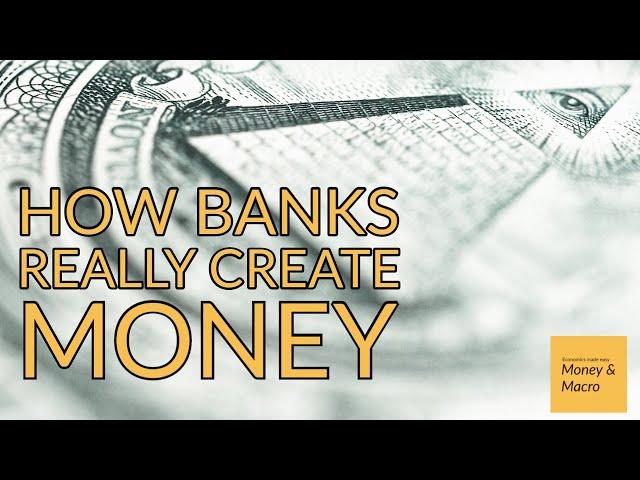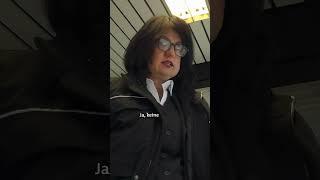
How Commercial Banks Really Create Money (the Money Multiplier is a MYTH).
Комментарии:

Thanks for this explanation
Ответить
Great video! Thank you! Somehow the last point of this wasn't clear to me...
but that ultimatley translates to "the people feelings about the future" from the Johnny Harris, that you commented on ->
let me explain:
If not reserve requirements is the limit to the money creation (but still - in the countries with bigger requirements it might be? -> could you confirm/deny that that could ever happen that the teoretical limit from the Money Multipilier Story was ever hit?) than all the individual decisions of the people (if people feel like they want to go for run-bank -> the banks are forced to limit their creation, lowering amount of the money in the economy -> eventually lowering prices/firing people etc.), same with "loan Demand" -> if people (or institutions) doesn't feel like the investment is worth their money - they would not lend money and ultimatley the amount of money in the economy would fall as well...
Somehow I just got entirely new light on "economic news" -> they have MUCH more power than I ever thought that they actually have. Going against the flow is in fact much harder than I tought (on a macro scale at least, for small average Joes there's still a lot of room to exploit any situation)

I have watched your video a few times, you do not discredit that banks create money. You just explain some extra steps involved in the money creation, but they do create money still
Ответить
Fed made the fractional reserve percentage from 10% to 0% ,banks can now actually print infinite money 🙂
Ответить
I don't understand this part: if a customer takes a loan from the bank, bank borrows money from customer and customer borrows from a bank at the same time?
Ответить
I think i watched something like modern monetery theory before. Bascally, it says money is tradable debt. I guess, u were saying that individual bank and individual person has risk and reward to consider when it comes to adjusting the mount of debt.. I guess governments have many ways too.. Building new projects, collecting less taxes or giving out pandemic benefits.. I have a question, why U.S and Japan can print out more money out of thin air compared to other weak states ?
Ответить
Hasn’t QE put enough money in the system ? So banks don’t look for funding after the loans most big banks have the reserves to meet payment obligations. How does Fed add more reserves ?
Ответить
A quick question, Is this also how banks work in some developing countries, where people don't rely on credit and loans to make purchases. And mainly use bank accounts for deposits. Because I still think some countries do money multiplier and even have deposits of cash reserves in their central bank e.g. my country Nigeria
Ответить
Your incorrect...
Ответить
the link to the blog is broken!
Ответить
We the People is securities! You must explain that to plus all other assets in the land!
Ответить
So the limit to bank money or financial credit creation is not customer demand only but also customer credit worthiness.
And it is preferable (for the bank) if that money reminds as banking figures rather than turning it into cash by borrowers because if the loans become cash and it surpasses the reserves then the bank has to ask the central bank for more printed money. But this system should be called different to avoid the confusion with the historical fractional reserve system

What is the difference with a full reserve or let's say 90% reserve system?
Ответить
This video is correct but is incomplete.
Banks create money - indeed.
Banks create RISK *
This means that we need to associate each change in the money supply with a change in total economic risk.
Bankers create Risk.

I don't understand the point about how reserve requirements DO NOT constrain money creation. You say that almost all central banks facilitate reserve creation on demand. Why is that? Why DO central banks "almost always" lend money to banks?
Ответить
The money multiplier theory doesn't assume the bank simply "has" assets it can use as a backing for potentially defaulted loans. That's the step which is being missed in this new theory. They're using the fed model on a commercial level, except the fed has the faith and trust of U.S. taxpayers as its backing. Do commercial banks? Apparently that's the new status quo.
So, the money multiplier isn't a myth; it's nothing more than a sane way to view economics; this new status quo is fully divested from reality. I guess we really are headed for another 1929...

So banks are middle men between people and fed, where fed’s goal is increasing the size of the economy.
And this job of middle man is very lucrative due to lender privilege and scale.

If people accept your checks at par to cash, you can technically create money.
Ответить
Essentially, banks create money because they manipulate their ledger. When they give a loan, they change a few numbers on the bank account statements, and record on their spreadsheet that they owe bank account A $1M, and Bank Account A owes them $1M. When you want to spend your money, the bank debits a few digits off your end of the spreadsheet, and credits the account you pay. Since people accepts bank obligations at par to cash, the bank can create money by changing their spreadsheet to add points to someones account.
Ответить
The amount they lend us, the bank gets 10x the credit……
Ответить
Research public law 73-10 … government will pay your debt, dollar for dollar…..
Ответить
It’s against the law for banks to lend money…..
Ответить
Banks steal our credit…….
Ответить
focusing on the fractional reserve element hoodwinks people to not see the elephant in the room, which is private entity's having the extreme privilege of money creation and receiving the interest payments on that newly created money which of course is the primary cause of inequality and poverty on a global scale..
Ответить
So your video admits/confirms most economists and bankers do not understand how money creation and the economy works. Doesn't seem much original research has been done over the decades to find proof about how the economy works - so much for economics being called a science.
Ответить
Isn’t the hard limit the credit worthiness of the customers themselves and the competition for them.
If I’m a bank and I’m worried you’ll default on your loan, then I’m not going to do the a loan because there’s a good chance I’ll have to write it off and eat the bad debt expense.

commercial banks do not pay interest?
Ответить
En Colombia las "leyes de encaje" son bastante rígidas respecto a las que tú mencionas allí. Resulta que acá hay unos requisitos de liquidez respecto a la cantidad de depósitos, pero la verdad es que ese fue el tema que más me ha costado entender en mi carrera profesional y este video me dejó peor. Igual gracias, tus videos la vacilan aunque tengamos posturas muy distintas a veces
Ответить
you keep using that word, i don't think it means what you think it does.
the money multiplier is not a myth.
it's just the laws were removed requiring banks to keep a fraction of deposits in order to let banks steal more from us.
in usa it was removed after the 2008 crash. in uk in the 80s i think.
the reserve requirements were real.
and the money multiplier was the old way of putting lending limits on banks to prevent running out of cash and prevent bank runs.
also no bank will go to the central bank for more cash reserves as it is a sign of distress and will result in a massive bank run.
this is why they prefer to use the overnight money markets between themselves..
so fractional reserve laws when they existed did have the money multiplier effect on money supply. and why banks would offer interest to savers so much back in the days.
now with the laws removing fractional reserves and banks being allowed to lend without limits. savings account don't pay anything anymore as banks don't need to keep cash reserves to lend anymore.
so it isn't a myth.
Just old model. and maybe partially incomplete model. especially with the order of the transactions.

I’m not going to lie this still makes it look like a Ponzi scheme. I know it is not because the central bank can just create money to back stop any issues but that fact alone makes it seem very scammy.
It is worth noting that when people talk about the Money Multiplier Theory they start with how the initial money is created within the system. It typical goes like this. The Center Bank create money and lends it to the government which then spends it into existence. This of course create the economy.

I don't understand how there can be a myth, and needing "research" to disprove something like this?
Either the banks loan money they don't have, or they don't.
So all this time economists and bankers have thought banks loan money they don't have, but in reality they've had the money all the time?
How can thousands of banks exist, who's main mission and expertise are loans, money, and ledger, been surviving without even knowing how much money they have and how mush they have lended out?
If I Gonnaga Bank have 1 million, and I loan out 2 million, I've done the Money Multiplier trick. But I haven't? I've actually earned my money by loaning 1 million and getting 1,2 back over the course of 20 years.
HOW has this NOT been common knowledge if that's the case? HOW can you run a company that only needs to know plus and minus, and not knowing basic plus and minus? HOW can tens of thousands of companies whos only criteria is knowing plus and minus not knowing plus and minus, at the same time??

Love a good throwback to see humble origins
Ответить
Svb failed cuz it couldnt fund customer deposit demand What did they do with that deposit money ? use to buy securities that lost value with interest rate rising?
Ответить
So its just fractional reserve banking but the reserve requirement is 0%.😂😂😂😂
Ответить
Tbe fed has eliminated reserve requirements now so that leads to what?
Ответить
Why when explaining this sort of things there are no clear numbers involved in simple form, "explain it like I am between 5 and 15 years old" or are they scared people will find it easy to point out their errors or/and maybe it would be just a lot of very hard work to make it clear? as always it is best starting at the beginning...
Ответить
not healpfull
Ответить
I didn't get it
Ответить
As per my understanding, reserve requirements are based on the capital or equity of a bank. If a bank is valued high, it needs to have more reserves. Deposits have no role in reserve requirements.
Ответить
It's not a myth, it's a lie.
Ответить
So basically a Ponzi scheme
Ответить
I have been curious if the lack of lending post-2008 was driven by the supply or demand side of the lending market? It seems the idea "lower rates will spur lending" is a purely demand-side phenomenon, but what about the compensation for risk on the supply side? We could clearly see examples where banks undervalued expected inflation by offering extremely low rates even when a simple quantity of money theory predicts long periods of sustained inflation, which was what I called since I saw the spike in 2020. Did markets get such a simple concept wrong or is there some other market force that can explain why banks kept interest rates so low despite the largest creation of money in history? I can think of reasons why Moral Hazard might offer an explanation but I am curious to hear if anyone has any other bright ideas?
Ответить
While I comprehend the information, there is a question which comes to mind after watching twice to examine carefully. With regards to the “other side” of the banking operation as a depository for customer savings, why does the bank not have the required reserves on hand to offset a bank run in the first place?
If loans are solely “created by federal allowance” as you’ve demonstrated, that would suggest there would be an excess of reserves available for depositors, which we know for a fact is not the case.
It seems default is inevitable and the system is wired to bust no matter what occurs.

"Banks do not take your money and do lending and lending it out over and over again" ?? That sounds like a strange sentence. The same bank does not do that, but multiple banks in a chain process do actually do that. So I don't see your refutation that money is being multiplied across banks. You then jump quickly to the amount of money creation but you haven't refuted the multiplication across multiple banks
Ответить
Good video title Joeri. 😮
Ответить
Money is created with debts. You go at the bank for a mortgage etc… They will lend you money that doesn’t even exist but it will when you will be done paying it. That’s how they create money. Simple as that.
Ответить








![[playlist] Music that relaxes you in the evening. (for rest, reading, sleeping) [playlist] Music that relaxes you in the evening. (for rest, reading, sleeping)](https://ruvideo.cc/img/upload/a3RjaHBMa0FGWk4.jpg)
















